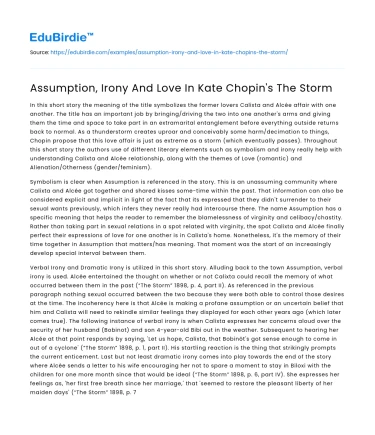In this short story the meaning of the title symbolizes the former lovers Calixta and Alcée affair with one another. The title has an important job by bringing/driving the two into one another's arms and giving them the time and space to take part in an extramarital entanglement before everything outside returns back to normal. As a thunderstorm creates uproar and conceivably some harm/decimation to things, Chopin propose that this love affair is just as extreme as a storm (which eventually passes). Throughout this short story the authors use of different literary elements such as symbolism and irony really help with understanding Calixta and Alcée relationship, along with the themes of Love (romantic) and Alienation/Otherness (gender/feminism).
Symbolism is clear when Assumption is referenced in the story. This is an unassuming community where Calixta and Alcée got together and shared kisses some-time within the past. That information can also be considered explicit and implicit in light of the fact that its expressed that they didn't surrender to their sexual wants previously, which infers they never really had intercourse there. The name Assumption has a specific meaning that helps the reader to remember the blamelessness of virginity and celibacy/chastity. Rather than taking part in sexual relations in a spot related with virginity, the spot Calixta and Alcée finally perfect their expressions of love for one another is in Calixta's home. Nonetheless, it's the memory of their time together in Assumption that matters/has meaning. That moment was the start of an increasingly develop special interval between them.
Save your time!
We can take care of your essay
- Proper editing and formatting
- Free revision, title page, and bibliography
- Flexible prices and money-back guarantee
Verbal Irony and Dramatic Irony is utilized in this short story. Alluding back to the town Assumption, verbal irony is used. Alcée entertained the thought on whether or not Calixta could recall the memory of what occurred between them in the past (“The Storm” 1898, p. 4, part II). As referenced in the previous paragraph nothing sexual occurred between the two because they were both able to control those desires at the time. The incoherency here is that Alcée is making a profane assumption or an uncertain belief that him and Calixta will need to rekindle similar feelings they displayed for each other years ago (which later comes true). The following instance of verbal irony is when Calixta expresses her concerns aloud over the security of her husband (Bobinot) and son 4-year-old Bibi out in the weather. Subsequent to hearing her Alcée at that point responds by saying, 'Let us hope, Calixta, that Bobinôt's got sense enough to come in out of a cyclone' (“The Storm” 1898, p. 1, part II). His startling reaction is the thing that strikingly prompts the current enticement. Last but not least dramatic irony comes into play towards the end of the story where Alcée sends a letter to his wife encouraging her not to spare a moment to stay in Biloxi with the children for one more month since that would be ideal (“The Storm” 1898, p. 6, part IV). She expresses her feelings as, 'her first free breath since her marriage,' that 'seemed to restore the pleasant liberty of her maiden days' (“The Storm” 1898, p. 7, part V). The irony here is that Clarisse is appreciating the chance of being far away from her husband (as he is of her) and she’s enjoying her “alone time” so-to-speak.
Next is the theme of Love (romantic). “Romantic love is distinct from other, non-romantic forms of love (e.g., familial love, spiritual love), from other social bonds (e.g., friendships), and from mere sexual desire (Berscheid 2010; Diamond 2004; Hendrick and Hendrick 1992)” (Mende, et al. 2019). According to Mende, et al. all will not respond to “romantic love in the same way” (2019). “Rather, a person's attachment style determines distinct beliefs about the course of romantic love, including differences in how people think, feel, and behave in romantic relationships (Hazan and Shaver 1987)” (Mende, et al. 2019). Mende et al. mentions “romantic consumption evokes the concept of romantic love and its accompanying romantic thoughts and feelings” (2019).
Last but not least is the information on the theme Alienation/Otherness (gender). By acknowledging female sexuality in 'The Storm', Chopin challenges controls on society and presents that women have a state in their sexual wants/needs. One of the things that “feminism explores, is the thoughts on sexuality as a domain of exploration” (Squires and Kemp). At the point when women's very own wants/needs were not tended to nor accompanied by their lovers, Calixta's character fills in as an exhibition of the women of the time allotment. Chopin likewise fundamentally impacts ladies by clarifying that when fulfilled, their inward wants will die down. Exactly like how ' the storm passed and every-one was happy' (“The Storm” 1898, p. 7, part V).
In summary, Kate Chopin’s short story “The Storm” brings the meaning of the story to life so to speak with the author’s use of literary devices and specific themes. With Chopin being a feminist writer, the theme Alienation/Otherness comes across with a powerful meaning. She basically renegotiated women’s roles. Making the bold statement that women are/can be far more than wives/mothers' and they have a right to express their sexual need/desires.
Works Cited
- Chopin, Kate. “Kate Chopin (1850-1904) The Storm (1898).” Lonestar, www.lonestar.edu/departments/english/chopin_storm.pdf.
- Mende, Martin, et al. “The Marketing of Love: How Attachment Styles Affect Romantic Conception Journey.” Galileo, Mar. 2019, eds.b.ebscohost.com.proxygsu-ecor.galileo.usg.edu/eds/detail/detail?vid=2&sid=789e4ebb-0cba-41e3-b206-dd94c50d50f3@sessionmgr103&bdata=JnNpdGU9ZWRzLWxpdmUmc2NvcGU9c2l0ZQ==#AN=135411924&db=bth.
- Squires, Judith, and Sandra Kemp. “Feminisms.” Galileo, 1998, eds.b.ebscohost.com.proxygsu-ecor.galileo.usg.edu/eds/detail/detail?vid=4&sid=efebfda8-80d9-4b09-9dd0-6af76fbea5bd@pdc-v-sessmgr03&bdata=JnNpdGU9ZWRzLWxpdmUmc2NvcGU9c2l0ZQ==#db=nlebk&AN=12335.






 Stuck on your essay?
Stuck on your essay?

